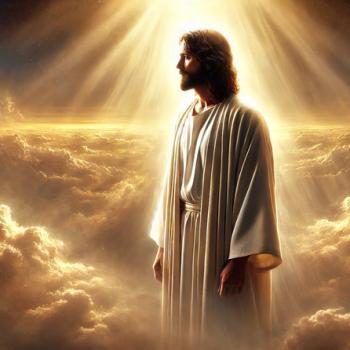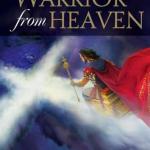Tribulation Force, pp. 331-336
Rayford watched the news and was certain Chloe had been correct. It had indeed been Buck Williams, not more than 30 feet from the witnesses and even closer to the gunman, who was now little more than charred bones on the pavement.
Commas can be tricky. The sentences that follow the ones above make it clear that Jerry Jenkins didn't mean to say, "It had indeed been Buck Williams … who was now little more than charred bones on the pavement." What he meant to say was pretty much the opposite — that Rayford realized Buck hadn't gotten charred:
Israeli television stayed with the images longer, and after watching the drama a few times, Rayford was able to take his eyes from the fire-breathing witnesses and watch the edge of the screen. Buck rose quickly and helped the dark-suited man next to him. Neither appeared hurt.
This is why re-reading what one has written, and then rewriting to clear up ambiguities, is part of most novelists' approach. But Jenkins isn't like most novelists and Tyndale House isn't like most publishers. Jenkins first draft is his final draft, and Tyndale is happy to forward that manuscript along to readers. Other books arrive in stores and libraries pre-read, but not this one. When you read Tribulation Force all the way through, you get to experience the thrill of knowing that you've just accomplished something the authors themselves have never done.
The downside of this, unfortunately, is that you also have to supply the work of mentally rewriting the sentences Jenkins never bothered to revisit himself. "It had indeed been Buck Williams, not more than 30 feet from the witnesses and even closer to the charred bones on the pavement where the gunman had stood." Much better. (But then again if the authors had re-read this passage, or if it had been read by a capable editor, then someone likely would have crossed out the whole page seeing as it only rehashes a bunch of stuff readers just finished reading.)
Rayford dialed the King David Hotel. Buck was still out, so Rayford took a cab to the King David and sat waiting in the lobby. Knowing better than to be seen with Buck, he planned to slip away to a house phone as soon as he saw him.
Here, again, our heroes are maintaining the extravagantly suspicious-seeming pretense of acting as though they don't know one another around the Antichrist. This despite having spent an evening out at dinner with the Antichrist's girlfriend, during which said girlfriend played matchmaker with Buck and Rayford's daughter.
Buck, meanwhile, is talking to Tsion Ben-Judah:
"In the long history of Judaism," Rabbi Ben-Judah was saying …
And suddenly I realize what it is that the rabbi reminds me of. He's like the stock American Indian, Noble Savage character whose devotion to the white hero signifies that the white hero is virtuous. "My people believe …" this stock character is always saying, offering platitudinous kernels of ancient, "traditional" wisdom that always sounds suspiciously like a cruder, more primitive version of whatever it is the hero believes. Just think of Rabbi Tsion Ben-Judah as a character in "Dances With Jews."
"In the long history of Judaism," Rabbi Ben-Judah was saying, "there have been many evidences of the clear hand of God. More during Bible times, of course, but the protection of Israel against all odds in modern wars is another example. The destruction of the Russian Air Force, leaving the Holy Land unscathed, was plainly an act of God."
B-J goes on for a bit, continuing to speak of "Judaism" as though it were a foreign subject to him and tossing around evangelical idioms like "Bible times." He explains that despite this plain act of God, and despite the miracles being performed by the witnesses, "their message [is] an anathema to the Jewish mind." These stubborn Jews, the rabbi says, as though he weren't one himself, could never accept the witnesses' claims about Jesus:
"His very name is as profane to the Jew as racial slurs and epithets are to other minorities."
Jews despise Jesus' "very name," the authors write, and the implicit anti-Semitism of Tim LaHaye's "prophecy" scheme bubbles closer to the surface. The authors seem on the verge of accusing "the Jews" of killing Jesus (as though he had been stoned to death instead of having been, rather famously, crucified).
The mischaracterization here is so strange, and the scarcely veiled nastiness so contemptuous, that you have to wonder if the authors have ever spoken to anyone Jewish, even for five minutes. But as a prominent American "supporter of Israel" (i.e. supporter of Israel's political right wing), Tim LaHaye has for many years met and worked with Jewish leaders in both the U.S. and Israel.
So how did LaHaye arrive at or sustain his belief that the "J-word" is regarded as a "racial slur" or "epithet" by his Jewish allies?
The only plausible explanation, it seems to me, is that the Jewish people LaHaye has spoken to have responded to Jesus' name as an epithet because that's how LaHaye has been using it.
It may seem strange, if you're at all familiar with the teachings attributed to Jesus of Nazareth, that LaHaye would be able to turn this name into an epithet or to employ it as a form of hateful speech. But remember that LaHaye's Jesus isn't like the Jesus you've heard about elsewhere. This is the Jesus of "Second Coming: Revenge of the Christ" — the bloody fantasy of mass-slaughter that plays out at the end of this series of books. This is the Jesus that is coming back to zap all Jews with his killer death ray before sending them to Hell for eternity so that he can delight in their unending torment.
Picture Tim LaHaye describing this Jesus of his fantasy to someone and it becomes pretty obvious why they come to find the very name offensive.
"No matter how impressive are these witnesses of Christ, you will not see significant numbers of Jews convert to Christianity."
"That's the second time you have referred to them as witnesses," Buck said.
Buck is excited because the rabbi alludes to the book of Revelation — the Most Important Book in the premillennial dispensationalist Bible. But he doesn't even notice that Ben-Judah has also just affirmed the claim of the witnesses — that Jesus is the Messiah.
My guess is that Buck doesn't notice that because the authors don't realize that this is what they've just had the rabbi say. They seem to be using "Christ" here as Jesus' last name, rather than as what it is — a title, or the claim to a title. By using that title as synonymous with Jesus' name, the rabbi here would be declaring his belief in that claim and that, apparently, is not what the authors intended him to be doing:
The rabbi spoke carefully. "Young man, I have not released one iota of my findings to anyone in three years. Even those who commissioned and sponsored my study do not know what conclusions I have drawn. I respect you. I admire your courage. I will take you back to the two witnesses tonight as I promised. But I will not reveal to you any of what I will say on television tomorrow."
The rabbi takes Buck back to his hotel, where Rayford is waiting in the lobby. Is he doing the bit with the newspaper in front of his face, like the hotel detective in one of the "Thin Man" movies? Of course he is:
Rayford was reading the International Tribune when Buck hurried past him to the desk and retrieved his key and a message. Rayford loudly rattled the paper as he lowered it, and when Buck glanced his way Rayford motioned he would call him. Buck nodded and went upstairs.
Now we know that Rayford and Buck aren't being followed by the Antichrist's henchmen, because we'd surely have heard them laughing at this display of Tribulation Force-style subtlety. The house-phone bit also allows Jenkins to squeeze two phone calls into one page, as Rayford tells Buck to call Chloe and he does.
Buck placed the call through the hotel operator and hung up, waiting for the call that would tell him his party was on the line.
Three calls in one page!
The phone rang. "Yes!"
"Buck!"
"I'm here, Chloe, and I'm fine."
She's so relieved to hear Buck wasn't crisped by the fire-breathing witnesses that Chloe forgets all about telling him about their simultaneous cookie-nibbling.
"Who's the rabbi?"
Buck told her. …
"Where does the rabbi stand?"
Buck and Chloe are only recent converts, but through the magic of praying the magic words, they have been transformed into real, true Christians — the kinds of people for whom "Where does he stand?" is a natural, normal question to ask about any new acquaintance. As in:
"There was a new visitor at church this morning, so I invited him here for dinner."
"Where does he stand on the infallibility of the King James Version?"
"He's solid."
"And where does he stand on a literal, six-day, young-earth creation?"
"Oh no, I forgot to ask!"
"And he's coming here to dinner? Good gracious! What if he's some kind of Gap Theorist? We could be exposing our children to evil!"
That's a slight exaggeration, but only a very slight one.
Buck tells Chloe to be sure to watch the rabbi's big TV special — as though she and Bruce had anything else to do besides sitting around watching CNN. Then they exchange "I miss yous" and hang up.
Rayford returned to his hotel to find an envelope from Hattie Durham. The note inside read:
Captain Steele, this is no practical joke. The secretary-general wanted you to have the enclosed ticket to the festivities tomorrow morning and to express to you how impressed he was with the service on Global Community One. While he may not be able to speak with you personally until tomorrow afternoon on the way to Baghdad, he thanks you for your service. And so do I. Hattie D.
Rayford slid the ticket into his passport wallet and threw the note in the trash.
If he can't treat Hattie like trash in person, then he'll have to settle for expressing his contempt for the note she sent.
The anti-Semitism in this book may be implicit, bubbling just beneath the surface, but the misogyny is always right out there in the open.
















